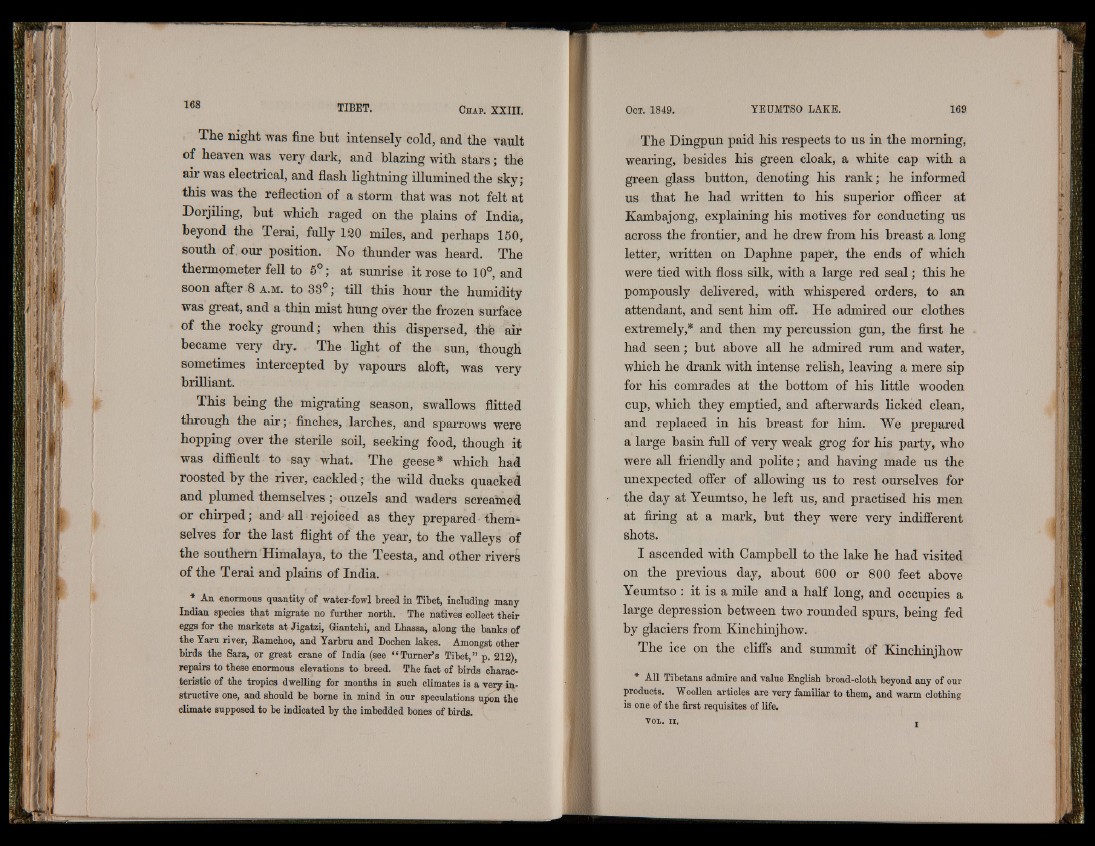
The night was fine but intensely cold, and the vault
of heaven was very dark, and blazing with sta rs; the
air was electrical, and flash lightning illumined the sky;
this was the reflection of a storm that was not felt at
Dorjiling, but which raged on the plains of India,
beyond the Terai, fully 120 miles, and perhaps 150,
south of our position. No thunder was heard. The
thermometer fell to 5°; at sunrise it rose to 10°, and
soon after 8 a .m . to 33°; till this hour the humidity
was great, and a thin mist hung over the frozen surface
of the rocky ground; when this dispersed, -the air
became very dry. The light of the sun, though
sometimes intercepted by vapours aloft, was very
brilliant.
This being the migrating season, swallows flitted
through the a ir; finches, larches, and sparrows were
hopping over the sterile soil, seeking food, though it
was difficult to say what. The geese* which had
roosted by the river, cackled; the wild ducks quacked
and plumed themselves; ouzels and waders screamed
n r chirped; and-all rejoiced as they prepared therm-
selves for the last flight of the year, to the valleys of
the southern Himalaya, to the Teesta, and other rivers
of the Terai and plains of India.
* An enormous quantity of water-fowl breed in Tibet, including1, many
Indian species that migrate no further north. The natives collect their
eggs for the markets at Jigatzi, Giantchi, and Lhassa, along the banks of
the Yarn river, Eamchoo, and Yarbru and Dochen lakes. Amongst other
birds the Sara, or great crane of India (see “ Turner’s Tibet,” p. 212),
repairs to these enormous elevations to breed. The fact of birds characteristic
of the tropics dwelling for months in such climates is a veryin-
structive one, and should be borne in mind in our speculations upon the
climate supposed to be indicated by the imbedded bones of birds.
The Dingpun paid his respects to us in the morning,
wearing, besides his green cloak, a white cap with a
green glass button, denoting his rank; he informed
us that he had written to his superior officer at
Kambajong, explaining his motives for conducting us
across the frontier, and he drew from his breast a long
letter, written on Daphne paper, the ends of which
were tied with floss silk, with a large red se al; this he
pompously delivered, with whispered orders, to an
attendant, and sent him off. He admired our clothes
extremely,* and then my percussion gun, the first he
had seen; but above all he admired rum and water,
which he drank with intense relish, leaving a mere sip
for his comrades at the bottom of his little wooden
cup, which they emptied, and afterwards licked clean,
and replaced in his breast for him. We prepared
a large basin full of very weak grog for his party, who
were all friendly and polite; and having made us the
unexpected offer of allowing us to rest ourselves for
the day at Yeumtso, he left us, and practised his men
at firing at a mark, but they were very indifferent
shots.
I ascended with Campbell to the lake he had visited
on the previous day, about 600 or 800 feet above
Yeumtso : it is a mile and a half long, and occupies a
large depression between two rounded spurs, being fed
by glaciers from Kinchinjhow.
The ice on the cliffs and summit of Kinchinjhow
* All Tibetans admire and valne English broad-cloth beyond any of our
products. Woollen articles are very familiar to them, and warm clothing
is one of the first requisites of life.
VOL. I I . j